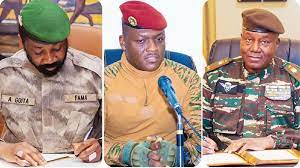Burkina Faso, Mali and Niger seem to have irreversibly turned their backs on the Economic Community of West African States (Ecowas).
This is the conviction of Abdoulaye Diop, Mali’s Minister of Foreign Affairs.
Speaking in Brussels, Belgium, on Thursday 27 June, he said that the three countries, which had stormed out of the regional institution to found the Alliance of Sahel States (AES) in September 2023, were committed to building a regional integration that would give their respective states and peoples more room for manoeuvre.
“Today, we are in the process of building a regional integration, another approach to (Ecowas), an integration which, from our point of view, must be a true integration of peoples and not an integration of states or heads of state,” the Malian diplomat explained, as he was taking part in the 36th edition of the Crans Montana Forum, held from 26 to 29 June in the Belgian capital.
In front of several Westerners, he explained that this dynamic is shared at the security and economic levels by the three countries that make up the AES. They are led by military juntas that are taking controversial steps to put an end to the violence of terrorist groups and to underdevelopment.
“There are convincing results on the ground. After ten years of foreign presence, Mali now has control over the whole of its national territory. And the recapture of Kidal (a town in the north of the country) a few months ago is a concrete example,” Mr. Diop stressed, promising other “Kidal events that will also take place on the ground,” even if attacks by jihadist groups continue to cause havoc for the armies and populations of AES countries.
State-building
While the international community and local political organisations believe that the military leaders of these states should organise elections and hand over to civilians, Abdoulaye Diop retorts that they are “in the process of building states.”
This “misunderstanding” led to “an extremely deep dispute” with the other Ecowas countries, resulting in sanctions being imposed on Mali, Burkina Faso and then Niger, following the unconstitutional changes to their regimes between August 2020 and July 2023.
It was after the threat of a military attack on the Niamey coupists that Bamako and Ouagadougou decided to set themselves up as shields against a possibe invasion by the West African bloc and its Western backers, including France.
They subsequently announced their departure from the regional organisation, which they saw as a threat
to the security of their states and populations, reinforcing their alliance with countries that challenge Western hegemony, such as Russia and China.
“Understand that with the AES, there is a new geopolitical order. Whether you like it or not, it doesn’t matter! For us, the fate of our countries will not be decided in Brussels, Paris, Washington or London. It will be decided in Bamako, Ouagadougou and Niamey,” the Malian minister said, stressing the need to maintain dialogue with the
Ecowas countries to determine “how we can live together.” The latter remain, despite everything, “brotherly countries and peoples,” he noted.
Following his election as Senegal’s fifth president, Bassirou Diomaye Faye travelled to Bamako on 30 May, where he attempted to defend a “much-maligned” Ecowas and preached the return of the AES countries to
the regional and political space.
“We must not give up and say that we can do no more. There are difficulties, we have to talk to each other and understand them and, on the basis of the level of understanding and the differences in position, see what can be built on what already exists,” he declared.
Although he had not come to Mali as a “mediator,” the 44-year-old “Pan-Africanist” leader felt that he had “no reason to give up hope of seeing Ecowas restart on new foundations.”
ODL/ac/Sf/fss/as/APA


